
Breaking Poverty podcast
A new Smith Family podcast
The Coronavirus pandemic has brought one of the biggest disruptions to education we’ve ever seen.
Now is the time to support all children to get the best education possible to meet the challenges of the future.
We’re proud to present the stories of the families and young people we partner with, as they join us in this two-part podcast looking at the challenges of poverty and how education offers a lasting solution to the problem.
They are determined to succeed in their education and go on to create better futures for themselves.
As we get our nation back on its feet, we need all young people to have the skills in their education to fully participate in our society as we rebuild.

Listen to Breaking Poverty here
Breaking Poverty - Trailer
Episode 1. Left Behind
Breaking Poverty episode one
Episode 2. Breaking Poverty
Breaking Poverty episode two
Breaking Poverty
Episode 2. Breaking Poverty
A Podcast One production.
Adam Shand: Welcome to part two of Breaking Poverty. I'm Adam Shand. If you think Australia as a nation has been spared the worst economic impacts of the COVID-19 pandemic, you're right. So far government spending on stimulus and social welfare has actually outweighed the economic cost to this country. However, a crunch is coming. Eventually the COVID-19 income support programs will come to an end, punching a $31 billion hole in the national economy. That's 1 per cent of Australia's GDP. We could lose the equivalent of 145,000 full-time jobs by 2022. Ironically, as we lose these jobs, there'll be demand for new skills in traditional and sunrise industries.
Adam Shand: Australia already has a skills shortage, but we face the prospect of importing workers with critical skills through targeted immigration. These are jobs that should be filled by Australian workers, but we must invest in those skills now, if we are to remain globally competitive while breaking a self-defeating cycle of poverty. Government can only do so much, charities like The Smith Family and the sponsors of children will have to close this poverty gap. Dr Lisa O'Brien is chief executive of The Smith Family.
Dr Lisa O'Brien: Adam, The Smith Family has been working with disadvantaged kids for nearly 100 years. And so, it's work that has been at the core of our mission for a long time. But sadly, over these last few months, firstly, with the bush fires and now with the COVID-19 pandemic, the need for our work is just even greater.
Adam Shand: We're seeing a middle class that's exposed, they're living on their next pay cheque. They don't have savings. And in the coming months, there's going to be a lot more people who are going to turn around and say, "I can't afford the mortgage. I can't afford the rent, and what happens to my children in that scenario?" Are you expecting a greater influx, a greater need for your services?
Dr Lisa O'Brien: Yes, I think that's very likely that we're going to see that in the future. Certainly, already we're seeing rising unemployment and I think there's probably significant underemployment as well. So, it's hard to really assess what the extent of the economic downturn and recession is going to be, but I imagine it will result in greater demand for the kinds of support that we provide, yes. Families access our services through the schools that their child attends, so we work in 91 communities’ right across the country and in those communities we form partnerships with schools. So, we've got 700 partner schools.
Dr Lisa O'Brien: And so, when we have additional funds available for our Learning for Life scholarship, we'll go to those schools and they'll help us to identify families who might benefit from the kind of support that we provide. So, we're already anecdotally hearing from those communities and schools that there is greater need.
Adam Shand: What is the criteria that you apply to these scholarships?
Dr Lisa O'Brien: So, these are all disadvantaged families, they're all low income families. We generally assess that level of disadvantage because the family is in receipt of a Health Benefit Card or Pensioner Concession Card. And the sorts of families that we support, as I said, they're low income, many single parent families, often there's a health or disability in the family. So, we know that 40% of the students we support and 50% of the parents identify as having a health or a disability issue. We also support a very large number of Aboriginal and Torres Strait Islander students. So, we have about 20% of the 56,000 kids we're currently supporting on that program are Aboriginal or Torres Strait Islander.
Adam Shand: Because, I guess, in earlier generations, government did a lot of this. Government was much more present in our lives. And what we've seen in recent years is that safety net in welfare be whittled away.
Dr Lisa O'Brien: Look, I think the issues of poverty in our society are incredibly complex, and as I've said, there's only one or two random events might sit between you and I and finding ourselves in those circumstances. But the solution to these issues is complex and yes, absolutely government has a role to play, but I believe the broader community does as well. Whether that's people who are volunteering, people who want to sponsor a child, a corporate partner who wants to provide some career opportunity and work experience for a young person who's struggling. I think we all have a role to play in helping our young people, our young Australians, to get the opportunity they need to succeed because ultimately, I mean, we all benefit if they do. So yes, government has a role to play, but I think there's a broader responsibility.
Adam Shand: One of the key elements of intergenerational poverty is an absence of positive role models from which young people can build hope and a plan for their future.
Dr Lisa O'Brien: In many communities where we work, there are very high levels of long-term unemployment. So, these kids grow up, many of them not having had a role model in regular employment. So, the parent in the household, for whatever reason, as I said, often it's something like a health or disability issue, as much as it being a single parent caring for the family. So, they're not seeing that role modelling of going to work each day and what long-term employment looks like. And so, that affects that child's sense of what's possible for them, but also narrows down their world around, "Well, what do I want to be when I grow up?"
Adam Shand: Visualizing success is critical to lifting individuals out of poverty.
Kaia Lui: So, I am currently finishing off my Bachelor of Commerce at Griffith University and then I'm most likely going to do a graduate program in accounting, and then either do a post-graduate in law or engineering.
Adam Shand: Kaia Lui grew up in Cairns, but she was born on Darnley Island in the Torres Strait and that's where her heart is. She's the oldest of four children. She went to school and lived on the mainland, but the family would head back to their island home whenever they could. This was an idyllic childhood. She grew up fishing, diving and swimming, learning her culture. Kaia's great-grandmother taught her to weave in the traditional way with coconut leaves, a skill that she's passing down to the next generation. She came from a hardworking family, but we're all a few steps away from poverty. Kaia's mother was diagnosed with a heart valve condition when Kaia was in primary school, which limited her mother's ability to work. Her father wanted to stay at home and help, but had to work himself. The family have struggled financially during this time and that's when The Smith Family came into their lives.
Kaia Lui: We would have been in primary school, my Mum signed us up for it. We just needed a little bit of help with buying some stuff for school. And I knew she was struggling, so it was just a big help then.
Adam Shand: Kaia is the first in her family to have a tertiary education. She studied commerce and has a six year plan to get a Master's of Business and another post-grad degree in engineering or law. Engineering, because her dad works in construction, and law because she did an internship through The Smith Family's School of Opportunity, at a law firm. She's also done internships with CareerTrackers and Skills360. She would have been on an internship in Barcelona, Spain this year, but COVID-19 put paid to that. Her sponsors have been with Kaia on every step.
Kaia Lui: Yes it is. Without them doing what they have, I don't think many of us would push to what we want to do. We'd most likely just stick to normal jobs, staying in our comfort zones, instead of travelling and moving away from the city.
Adam Shand: Disadvantage among Indigenous Australians is a national disgrace. There's a 25 per cent gap in year 12 completion between Indigenous and non-Indigenous young people. Last year, the Coalition government boasted that under its watch, the number of Indigenous people in tertiary study had risen by 32 per cent. It sounds impressive until you note, the total number of students is less than 20,000, representing just 4 per cent of Indigenous Australia. The improvement is welcome, but we still seem to be grossly underachieving. Kaia has cleared many hurdles on her tertiary journey.
Kaia Lui: It was really hard for me to move away from Cairns because my family struggled a lot financially, especially because I was working before I moved down to Brisbane to study. But how I look at it in the long-term is that if I do this studying now, I can do the job I want and make the money I want, just to help my family out a lot.
Adam Shand: She's walking her own path, but there's no doubt Kaia is a trailblazer and pioneer for others.
Kaia Lui: Yes. That's what many people say, but I don't really see it like that. I don't really know how I see it. I just do what I do. I'm the oldest of four, so I've got another three after me. They don't really say much, but I hope they look up to me. My little sister graduates this year, so she is supposed to come down for uni as well and study aerospace or something like that. I've always been like a second mother to everyone. So, I've sort of just grown up looking after them and making sure they're all right. If they ever need anything, I'm always there for them.
Adam Shand: Kaia says she would never have gotten through high school without the support of her loved ones and her Family Partnership Coordinator. It's been a tough year for Kaia and her family. She and her partner, who's also from the Torres Strait, move to his family's island. She's been trying to study there and although there is 4G, there's only one tower, so downloading lectures is hard. Kaia worries about her Mum's health and her sister had to give up work shifts in retail, over fear of getting the virus.
Kaia Lui: Oh, the support's amazing. The person who looks after me, my coordinator Josh, he's been really helpful. He calls up probably every month, every couple of months, just to check on me, make sure everything's all right, if I need a hand.
Adam Shand: Dr Lisa O'Brien says early intervention and continued support enables Indigenous students like Kaia to succeed.
Dr Lisa O'Brien: We have over 10,000 Aboriginal and Torres Strait Islander students who are on our Learning for Life program and like the other students, we'll start supporting those kids from an early age in primary school, usually in the first or second year in primary school. And we really focus in, first and foremost, on school attendance, making sure that they're attending school regularly. We track our outcomes and we know that the Aboriginal kids that we support are attending school at a higher rate than their peers who are not on the program. We also know that with the long-term support, they're more likely to finish year 12 and they're also more likely to go on into further study or employment. We know that four out of five of our students are in long-term employment or study after exiting from the program.
Adam Shand: It's easy to be despondent about disadvantage, but when Australians of all backgrounds apply themselves to education, the results are apparent.
Dr Lisa O'Brien: It's almost like all boats rise, in a community where there's higher levels of educational engagement, more kids are completing school and going on to further study, they create role models for the cohort who are coming behind. And so, that community building aspect of education is really vital to what we do.
Christine Cawsey: So, my name's Christine Cawsey, I'm the principal of Rooty Hill High School, a large comprehensive school in Western Sydney. And I've been here for just over 20 years and I've had the privilege of being a member of The Smith Family board since 2013. We sometimes underestimate how well our education system actually works. There's a bit of a myth that we're somehow failing in Australia, but in fact, the majority of our children go on to have quite successful lives. I can't speak yet post-COVID, but up until now, the majority of children who were able to stay at school, the majority of students who were able to attend school regularly, the majority of students who were able to participate in learning, were successful at school.
Christine Cawsey: Perhaps not as successful on some of the measures that you see in the front pages of the papers like ATAR or NAPLAN, but in where they went in their post-school destinations. And Australia has a very, very good record of where young people are at age 25 when intervention has happened early and when it has continued through to support them in the transition from school at the end of Year 10, 11, or 12, depending on what career pathway they're headed to.
Adam Shand: Breaking poverty means ensuring that education is fit for purpose and can provide a vocational pathway for meaningful participation in our economy.
Christine Cawsey: We haven't really thought about education as an investment, we've often thought about it as a cost, and increasingly where you live and where you go to school makes a difference. There was a period in this country, quite a long period, nearly 20 years between the '90s and the mid-2000s, where the difference between student growth and performance was greater within a school than between schools. In more recent years that's shifted. But schools can't do it alone and sometimes having someone else there to walk with them, there are a number of not-for-profits who do excellent work in supporting young people with the interface between school and the home.
Emily Fioramonte: Honestly, when I got receipt of The Smith Family scholarship, I genuinely believe that that was a moment I felt like I'd broken the cycle of poverty because I thought, "No matter what happens from here, I know that I'm going to have financial security in my life." And that was the first time in my life I've ever felt like that.
Adam Shand: Emily Fioramonte grew up in a single-parent home below the poverty line in Melbourne. There was no shortage of love or even opportunity, but Emily had to overcome her own self-doubt.
Emily Fioramonte: I grew up with supportive parents who would say, "You can achieve whatever you set out to, you just have to work hard," but it wasn't until I got a little bit older in high school that I started to have deep self-doubt. And I wasn't surrounded by people who were working in necessarily industries where you need expertise or higher education. So, that's when I started having more affected thoughts about what I could do with my future. I don't remember thinking, "We're poor and I won't make it," but it was more a subconscious knowledge that people in your position do not end up with the big jobs and do not end up with a better off life. It was definitely a subconscious knowledge.
Adam Shand: Emily had been receiving support from grade four, but this self-doubt followed her through high school, and in Year 11, she almost sabotaged her own chance at success.
Emily Fioramonte: I didn't care about education. I didn't see myself going to uni. I was like, that's not for me. But I feel that the turning point was, I had to hit that rock bottom of personal things that were going on, both in my home and in my personal life that I realized that some kind of change needed to happen. I was in one of those positions where it's literally path A and you can get back on track or path B and you're going to screw your life up. So, I was facing expulsion from the school, they asked me to leave. I was on behavioural contracts. And then, when I was in Year 11, I sat an English exam, one of those mid-term tests that you sit in VCE. And I did really surprisingly well and I hadn't prepared for it because I was pretty naughty at that stage. And I realized that was how far I could go without putting in the hard runs.
Adam Shand: Colleen Martin is a Family Partnership Coordinator with The Smith Family. Her role is to provide support to sponsored children, to keep them on track.
Colleen Martin: What I see over and over again is that young people actually kind of catch that moment when they realise that financial disadvantage or hardship that challenges families, and even difficult years at school, when you have someone believing in you, like The Smith Family and their sponsor, it changes the way a young person feels about themselves and what's possible for them. And I see that over and over again. And that's one of the reasons why I'm here actually, just to support young people's educational journey, to support them, to see that they can dream and to see them achieving those dreams.
Adam Shand: Once she cast off her negative mindset, Emily hasn't looked back. This journey culminated in a Commonwealth supported place at Melbourne University, where she's now studying for a post-grad law degree.
Emily Fioramonte: And then I opened the email and I was home alone, yeah, it said, "Congratulations, you've got a place." And I just dropped to my knees. I was crying. I didn't think that I would especially get the Commonwealth supported place, which basically means they cover a large portion of the fees and you don't have to pay anything upfront. That was a true miracle. I was really stressed. So yeah, that was a very joyful moment for me. Yeah.
Adam Shand: Emily has plans to become a human rights lawyer when she graduates.
Emily Fioramonte: Well, wherever I end up, I know that I want a significant portion of what I do to contribute to removing barriers of access to justice, and helping to achieve structural equality for people who just are currently marginalized or their voices just aren't being heard by the government. So, that's something I'd love to work on in five years’ time, and even right now.
Adam Shand: Giving something back to community is a priority for all the students I spoke to. As we've seen, individuals who stay the course in education and achieve financial security will help break the poverty cycle in this country.
Vanessa: So, for all these people that have, or looking at being a sponsor, please, please, because you're hearing from a grateful grandmother, that without the help of these people, that my grandchildren wouldn't have had the opportunities to go forward to excel at higher education. And if that's something that somebody out there really wants to help with in getting these young Australians, these children, to be everything that they dreamed of, dreams are not unattainable, nothing is insurmountable.
Fahad: If I could go back in a time machine and go back to when I was born, I would never choose coming from any background rather than disadvantaged, because I think that disadvantage gave me resilience. It gave me resourcefulness. So, I feel that if you're from a disadvantaged background, you should wear that as a badge of, I don't know, honour, because that shows that you can go through hardships and still end up coming out the other end with a smile on your face. So, it's something that instead of feeling negative about, that you should be very proud of yourself for being from a disadvantaged background.
Adam Shand: This has been just a taste of the positive effect of education on breaking poverty. Unfortunately, government handouts will not be enough. It falls to us in the community to help support organizations like The Smith Family, who have a proven track record of success in using the power of education to help break poverty once and for all.
Podcast interviewees
In our family, we didn't really have any people who went past say Year 10 education. It was always doing very manual labour work, and there's nothing wrong with that. But it was just that that seems like the only thing we could do.
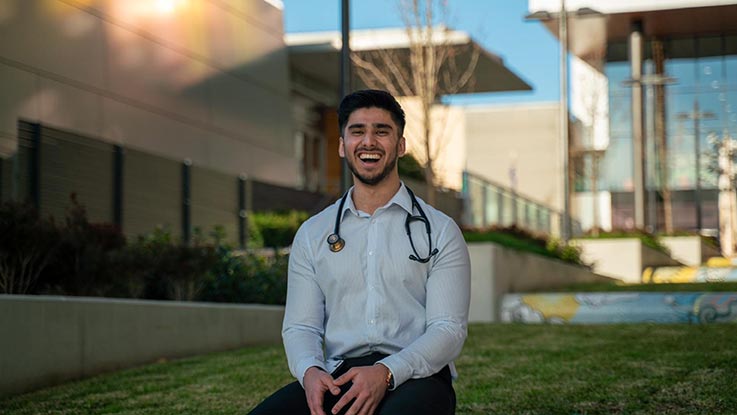
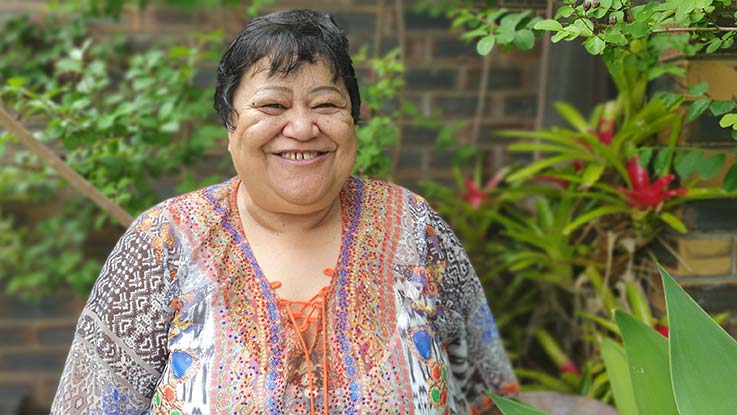
The children, they go skipping off to school, they’ve got a good lunch, backpack. They’ve got the shoes, the socks, the proper uniform.
I opened the email and I was home alone, yeah, it said, "Congratulations, you've got a place." And I just dropped to my knees. I was crying.
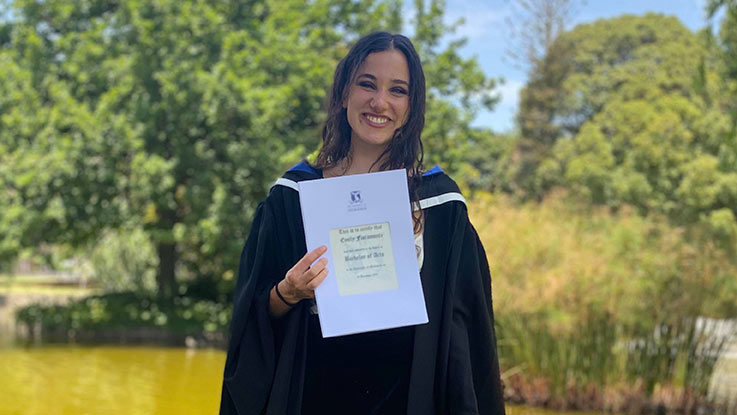
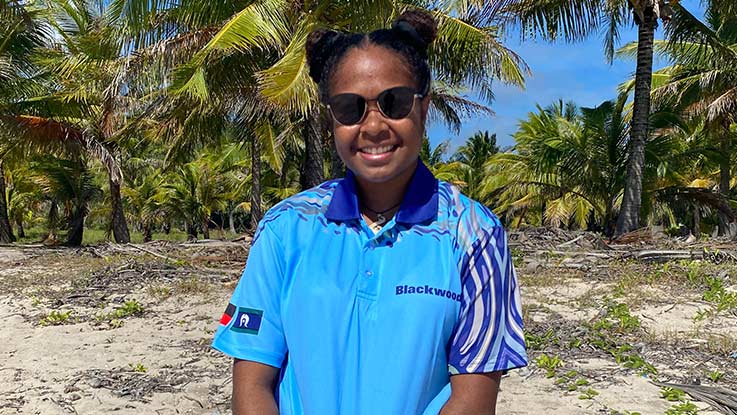
It was really hard for me to move away. But how I look at it in the long-term is that if I do this studying now, I can do the job I want and make the money I want, just to help my family out a lot.
Find out more
-
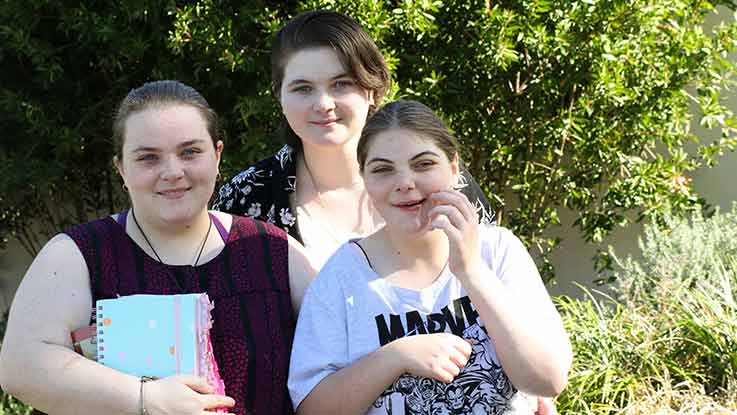
About Child Sponsorship
Get more information on how child sponsorship with The Smith Family works. -
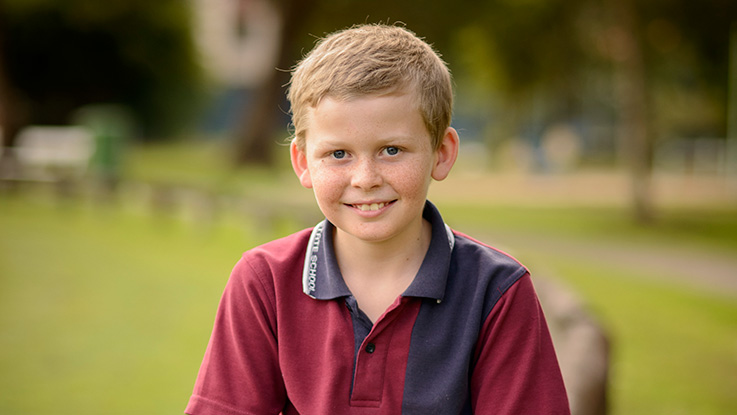
Student stories
Hear from the children who are sponsored through The Smith Family.
-
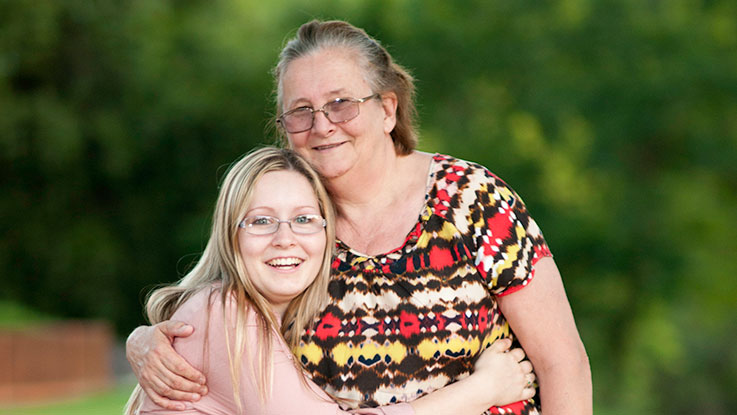
Our learning programs
Read about how The Smith Family works with communities around Australia.
